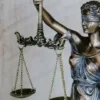The faces of John Lewis, Malcolm X, Ruby Bridges and many other civil rights leaders were carried alongside the hundreds of marchers as they traveled through the historic Annapolis streets.
The signs represented a desire by most who marched to honor those who came before them.
On Aug. 28, 1963, about 250,000 people traveled to Washington, D.C., to attend the March on Washington for Jobs and Freedom. There, Martin Luther King, Jr. delivered his historic “I Have a Dream” speech as people stood near the Lincoln Memorial. Hundreds of Annapolis residents boarded five buses departing from downtown and headed to the nation’s capital. Approximately 6,000 Maryland residents participated in the march, The Capital reported at the time.
Sixty years later, hundreds of people traveled from Navy-Marine Corps Memorial Stadium to City Dock in Annapolis on Saturday to commemorate the 60th Anniversary of the March on Washington.
The anniversary was a partnership of the city, Maryland Commission on African American History and Culture and the Caucus of African American Leaders. Saturday’s events included speakers at Susan Campbell Park and were attended by several Marylanders who attended the march in 1963.
“We don’t call this a commemoration, we call it a continuation,” Carl Snowden, the convener of the Caucus of African American Leaders, said during the ceremony that followed Saturday’s march. “This is a struggle that did not end. It continues.”
The sweltering morning saw the Morgan State University marching band lead the crowd, which included local leaders and state elected officials, through the streets as signs reading “I will show up,” and “Black Lives Matter” waved in the air.
People stood on their porches and waved as the marchers, some of whom wore matching gray shirts with the event theme, “commemorate, educate, activate.” Chapters of several historically Black fraternities and sororities also took part.
“Commemorate, educate, activate,” the marchers chanted in a call-and-response format.
The theme was chosen to not only remember those who partook in the 1963 march but encourage the next generation to continue the fight for equality, Tamara Wilson, chairperson of the march said.
“There’s still injustices that are enacted against our people on a daily basis,” she said. “We still have some freedoms that are not available to us readily. We’re still fighting for the same rights that everyone else has, whether it’s the criminal justice system, whether it’s health disparities, there are so many issues that we are fighting for.”
The march began near the Civil Rights Foot Soldiers Memorial at what is now known as People’s Park on Calvert Street, next to where the buses ferried people to Washington. Participants took time to reminisce about those who laid the groundwork for this moment as a common theme among attendees was a desire to continue the fight for equality.
Carla Nelson brought her daughter to learn about activism.
“It’s my job to teach her civic responsibility,” Nelson, a member of the Zeta Phi Beta sorority, said as her five-year-old daughter, Aunika, stood beside her. “So injustice anywhere is a threat to justice everywhere and she needs to know that at five.”
The Morning Sun
Daily
Get your morning news in your e-mail inbox. Get all the top news and sports from the baltimoresun.com.
Valerie Dillard has lived in the city for 25 years and said it’s important to march in Annapolis because of its historic role in the slave trade.
“You can’t separate Annapolis from Black culture,” she said. “Where we’re marching to City Dock it is a historic place for Black people. That’s where slave ships docked and auctions took place.”
Echoing this, both Chantel Johnson, director of the Banneker-Douglass Museum, and Edwin Johnson, chair of the state Commission on African American History, said it’s important to keep showing up and doing the advocacy work as an example for future generations.
“Everything they enjoy today didn’t just come,” Johnson said.
Later in the day, the marchers listened to speakers and stood as “Lift Every Voice and Sing,” the Black national anthem, was preformed, and cheered at the mention of Black accomplishments.
In his keynote remarks to the marchers, Morgan State President David Wilson said King’s speech in 1963 had a profound impact on his life as the son of a sharecropper who grew up in poverty.
“Our responsibility is to not get amnesia,” Wilson said, “and to move forward and continue to open those doors of opportunity for others and fight back when people are trying to erase [Black history] from our history books.”


